5
After running a checkdisk and rebooting to repair files, Windows 10 now boots to a black screen with no mouse cursor. (Specifically, I restarted to perform a checkdisk, which completes to 100%, the screen goes black, and that's it. Rebooting runs the check again, then a black screen, or shows the normal Windows startup spinner, then a black screen. There is never a mouse cursor and the screen resolution is low. Restarting shows the startup failure assistance app every three reboots.) After a lot of fiddling around with dism in several ways and svc, which fixed some items but now report 100% health, my last resort is to reinstall Windows 10 from ISO over my existing installation. How do I do this?
- The boot fail help app offers to either wipe apps (though it doesn't specify if this is normal programs or Windows Store apps or both), or wipe apps and files. There is no option to simply install keeping what already exists.
- The ISO either implies it wipes apps and files, or requires that you start the "upgrade" from within Windows itself (which doesn't work while Windows won't start properly.)
I would like to reinstall, but keep existing installed applications, documents and settings. Nuking drivers is ok.
Is there a way to install "over the top", the way there used to be in older versions of Windows?
Details
When Windows detects it has not started properly (seems to happen the third time you reboot) it boots some kind of recovery app:
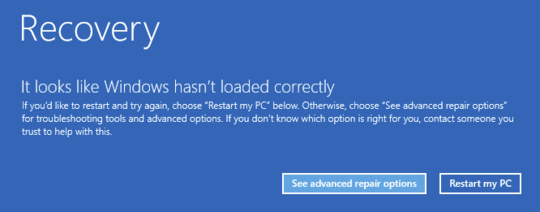 Restart of course fixes nothing, and Advanced shows a number of options, including showing a command prompt, resetting the PC, or reverting to a previous build.
Restart of course fixes nothing, and Advanced shows a number of options, including showing a command prompt, resetting the PC, or reverting to a previous build.
(I chose the options to detect startup problems - none found; and through the command prompt ran simc and svc - svc found some errors and fixed them, but there's no effect in helping it boot.)
Going back to the previous build implies you will lose some apps and settings:
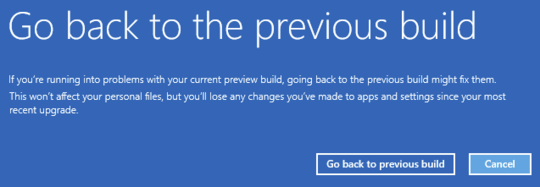
...so is not an option. Also, the current build was fine.
Resetting offers to either wipe the PC completely, or wipe all apps:
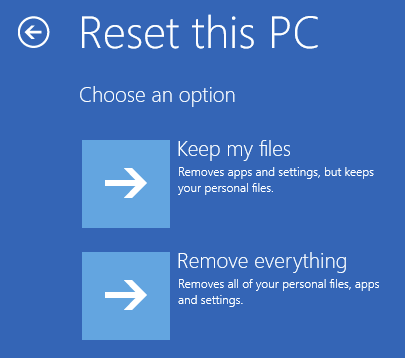
Neither of these is an option if you want to retain your installed applications and data - in fact I'm not sure what the use is, why anyone would want to lose their apps. (I don't know if this refers to Windows Store apps or all applications. As noted above, I would like to reinstall, but keep existing installed applications, documents and settings. Nuking drivers is ok.)
Although it's unclear exactly which apps and settings are removed, Microsoft is pretty clear some important items are deleted in this article about a Refresh install in Win10: "Select Keep my files. This option keeps your files plus apps that came with your PC. Apps you installed and changes you made to settings will be removed." If those are Windows Store apps, I'm ok with it, but if those are normal applications and settings, that is an unacceptably lossy operation.
Booting from a Win10 ISO is less clear. There are two options:
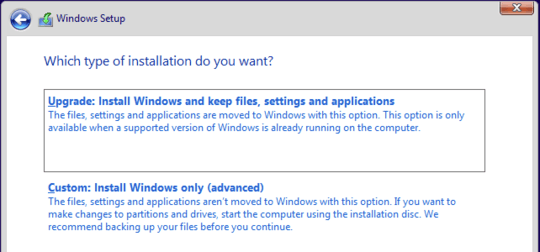
The first is presumably the one to use to keep installed application and files.
The second implies that it performs an app-wiping reset, although I may be reading this into it because of the language from the Reset command. I am not sure if this is true.
Going with the first informs you that you need to start the update from within Windows, which is not possible when Windows won't fully boot.
Going with the second gives an error that it needs more space in order to install (the dialog is shown when clicking the Show Details link):
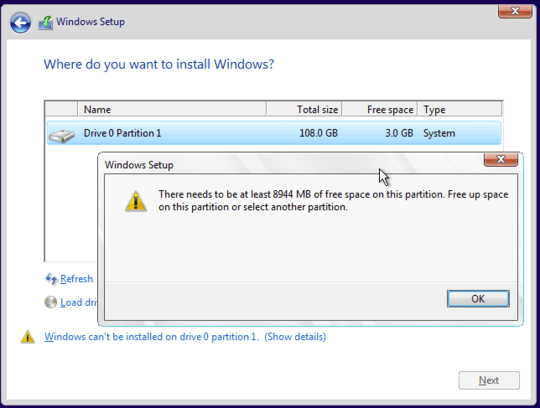 Which also is not possible, and so it doesn't seem to be performing a simple reinstall after all.
Which also is not possible, and so it doesn't seem to be performing a simple reinstall after all.
So: how do you perform a lossless, app- and document- and settings-keeping, repair or reinstall of Windows 10?
What applications have you installed since upgrading to Windows 10? – QMord – 2015-11-02T23:34:31.060
1You don't. If you are not willing to Reset your installation then your out of options. – Ramhound – 2015-11-02T23:35:55.857
@Ramhound So - a reset really does remove normal applications (ie non-Windows Store ones)? It's definitely not an installation over the existing install, leaving programs and files? – David – 2015-11-02T23:54:34.587
@QMord Several, including a couple of IDEs that took a few hours to install, some scientific software, etc. It doesn't represent a trivial amount of time. – David – 2015-11-02T23:55:25.777
Yes, it will remove every application on the PC. – QMord – 2015-11-02T23:57:01.537
That's ridiculous! Surely there is a way to simply reinstall? – David – 2015-11-03T00:03:43.223
1The description of Reset when you choose to keep your personal files is crystal clear. Your application settings and applications will be lost, your personal files, will be kept. – Ramhound – 2015-11-03T02:25:08.347
1
So: how do you perform a lossless, app- and document- and settings-keeping, repair or reinstall of Windows 10?- In the old days you could do this while booted from an install disk (in fact, you had to). These days, you can't (at least without extreme difficulty). Unless you are reformatting, Windows won't wipe anything when you do a clean install from the ISO - it will install a second copy of Windows alongside the old one on the same drive. This is why it needs more space - everything is kept. You may be better off continuing to try "fix" it via recovery console or safe mode. – qasdfdsaq – 2015-11-03T13:02:01.0971Not without making a backup, unfortunately. You could try booting into a Live OS (Ubuntu, Knoppix), copying the data to an external drive, and then using the reset option. – Khashir – 2016-08-29T16:30:41.120